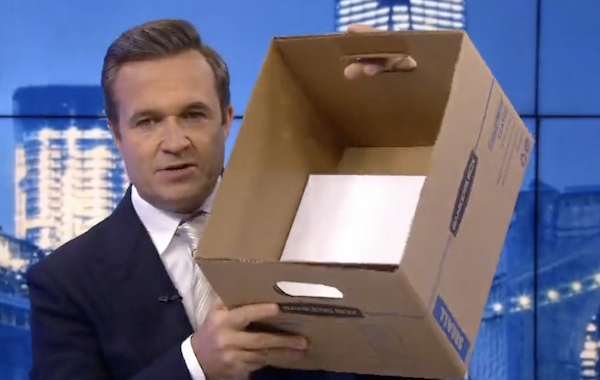Politics
WATCH: Newsmax Host Exposes How DOJ Is Dishonestly Trumping Up Documents Charges With Live Demonstration

Newsmax host Greg Kelly criticized the indictment of former President Donald Trump on his show Tuesday night, arguing that the images of numerous boxes included in the indictment are purposely misleading. Kelly pointed out that although dozens of boxes are shown in the indictment’s pictures, the FBI only recovered 102 classified documents.
He then showed live on his show that one box can hold hundreds of pages, questioning the number of documents seized by the FBI would not even fill one box.
“So I went to the indictment and saw that how many documents classified documents did the FBI actually recover? A hundred and two. A hundred and two. So everybody I got a box right here. All right. This is one box. One box. And inside I have 600 pages.”
WATCH:
Trump faces a federal grand jury indictment for numerous offenses concerning his handling of classified documents. The indictment details that Trump kept hundreds of documents in cardboard boxes during his presidency. Upon leaving office, these boxes were transported to Trump’s Mar-a-Lago Club in Florida, which was not an authorized location for the storage of classified documents.
The indictment further alleges that, in 2021, Trump exposed classified documents to individuals lacking security clearance on two separate occasions. One incident involved an audio-recorded meeting where Trump showcased and described a “plan of attack” formulated by the Department of Defense, attended by a writer, a publisher, and two staff members. In another occurrence, he revealed a classified map pertaining to a military operation to a representative from his political action committee.
In March 2022, the Federal Bureau of Investigation (FBI) initiated a criminal investigation into the unauthorized possession of classified documents at The Mar-a-Lago Club. Subsequently, a federal grand jury launched its own investigation. Trump stands accused of obstructing both the FBI and grand jury investigations.
Late last week, an FBI agent who was in charge of the raid in Mar-a-Lago admitted he had “strong concerns” about the operation. In a letter written by Jim Jordan, Chairman of the House Judiciary Committee, he detailed the Committee’s serious apprehensions regarding the impending indictment and arraignment of Trump.
These concerns were reinforced by information obtained during an interview with Steven D’Antuono, the former Assistant Director in Charge of the FBI’s Washington Field Office, who played a senior role in the Mar-a-Lago raid.
One issue was the decision to assign the execution of the search warrant to the Washington Field Office instead of the Miami Field Office, which had sparked questions about the involvement of headquarters in the investigation. D’Antuono was confused as to why the Miami Field Office, responsible for cases in that region, was not leading the operation.
Another point of concern was the absence of a U.S. Attorney’s Office assigned to the case, which D’Antuono found unusual for a high-profile matter. He voiced his concerns with Department officials but received an unsatisfactory response, discovering that the National Security Division would handle the case. Jay Bratt, the head of the Department’s counterintelligence division, would serve as the lead prosecutor.
D’Antuono also noted the FBI’s failure to seek consent before executing the search, expressing his belief that attempting to obtain consent from President Trump would have been a more appropriate approach. He emphasized the benefits of consent for all parties involved.
Furthermore, D’Antuono disagreed with the decision to exclude President Trump’s attorney from the search. He claimed that working with the attorney to seek consent before obtaining a search warrant would have been a more suitable course of action. He also expressed the belief that proper communication could have potentially led to obtaining consent.
In response to D’Antuono’s testimony and the Department’s refusal to provide the requested information, the committee reiterated its request for documents related to the raid. Specifically, they sought documents and communications pertaining to meetings between FBI and Justice Department officials, the execution of the search warrant, and any correspondence involving key individuals connected to the case.

